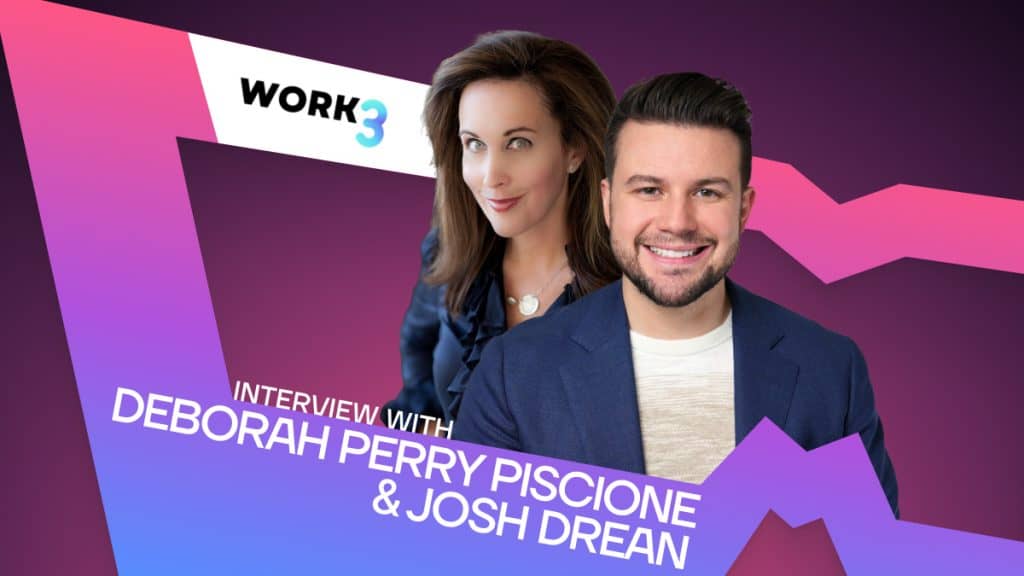In a conversation about the future of work in the Web3 landscape, Deborah Perry Piscione and Josh Drean shed light on emerging trends and expectations.

As we stand on the verge of a transformative era in how we engage in work, the conversation between Sergei Medvedev and Work3 Institute's co-founders, Deborah Perry Piscione and Josh Drean, reveals valuable insights about the impact Web3 will have on traditional work structures.
Bringing a rich background of experience, Piscione is a serial entrepreneur, a best-selling author, and a venture capitalist. Meanwhile, Drean is acknowledged for his expertise in HR transformation and the metaverse, serving as a Web3 Advisor at Harvard Innovation Labs. Together, they've launched the Work3 Institute, dedicated to pioneering research, thought leadership, and consulting to assist organizations in adapting to Web3 by moving away from outdated management practices to enhance the employee experience.
During their discussion, Piscione and Drean provide their perspectives on how Web3 technology could fundamentally alter conventional workplace frameworks and influence the future workforce. They also highlight the innovative opportunities that emerge when Web3 principles merge with human-centered digital transformation approaches. As they co-author a book addressing these themes, they are well-equipped to offer in-depth analysis on how Web3 might redefine our work environments.
Could you tell us a bit about yourself, Deborah? Your background is quite impressive.
Deborah Perry Piscione: Thank you! I’m thrilled to be here. To give you a brief overview of my journey, I dedicated 18 years to politics in Washington, DC, working closely with Capitol Hill and the White House. Along the way, I accidentally stepped into the media realm, becoming a commentator while pursuing my education. I learned a couple of things effectively: how to create division among people and harness their fears, since stirring fear often leads to more viewers or voter support. In 2006, my husband announced our relocation to Silicon Valley, and I was taken aback—after 18 years in politics, I was about to dive into the tech world of giants like Google and Intel.
Shortly after we arrived in Silicon Valley in 2006, while waiting in line at a Starbucks, a friendly woman asked if I was new and offered her help. That encounter led to venture capitalists raising $5 million for a project, which was quite successful—it sold just 18 months later.
I quickly became intrigued by the collaborative ecosystem within Silicon Valley. It was filled with unspoken rules dictating how individuals interacted and performed together. This fascination inspired me to pen the book 'Secrets of Silicon Valley' and to establish four additional companies while writing three other books focusing on innovation and optimizing our individual contributions. Then, driven by my sons who encouraged me to invest in Bitcoin, I ventured into the web3 realm, drawn to its principles of democratization. It’s been a remarkable transformation for me.
Thank you. What about you, Josh?
Josh Drean: It’s a pleasure to reconnect with you, Sergei! Last year in South Korea was unforgettable, and I’m grateful to be having this conversation today alongside Deborah Perry Piscione, co-founder of the Work3 Institute. We're working on an insightful book for the Harvard Business Review Press set to publish next year, and we’re thrilled about it.
As for my background, I was fortunate to be a part of Harvard, where my passion for entrepreneurship blossomed upon discovering the Harvard Innovation Labs. This incubator empowers startups to innovate based on market needs. I focused on crafting strategies that listen to employees, helping organizations create better workplace experiences. It’s apparent that the current work structure often benefits organizations but overlooks employee fulfillment. My role as a web3 advisor has opened doors in understanding the burgeoning interest in these new technologies and concepts, allowing me to assist Harvard students in navigating this landscape and anticipating the future of work.
During Metacon, we discussed the metaverse's significant role in shaping the future of work. After applying to Deborah's conference, I was eager to learn about her initiatives, and our conversation sparked the idea to collaborate on a book.
Right now, we’re advocating for a modern approach to work, emphasizing that the old structures are outdated. What we need is a framework that supports productivity while also enriching employees' experiences. We firmly believe the answer lies in a decentralized web3 model for work.
Employees are beginning to reclaim autonomy over their work and lives, leading to increased flexibility and ownership of their creations. A glimpse of this shift is evident among the younger generation playing Minecraft. Our mission is to enlighten others about this forthcoming transformation in work dynamics, ensuring that employers are prepared for the changes ahead.
Thanks, Josh. Have you come across the book Bullshit Jobs by David Graeber?
Josh & Deborah: No.
Graeber's insights were remarkable, and it’s unfortunate he’s no longer with us. There’s a widely accepted notion that countless jobs exist solely to occupy people’s time rather than contributing meaningful value. What are your thoughts on this? Do you think the advent of web3 could change this reality?
DPP: Absolutely! I've been an advocate for web3 concepts since my early teens because I never fathomed the rationale behind traditional work hours, especially in established industries. If I could complete my tasks by 3 PM, why was I required to remain until 6? And why was working through the night celebrated? The convergence of various trends, including the rise of Gen Z and Gen Y, is set to reshape the workforce's landscape. For them, the focus is shifting toward passion projects, rather than the stability of homeownership and long-term employment that previous generations prioritized. The future of work will center around doing what you love, and employers must swiftly adapt to this new reality to engage the upcoming workforce that won't adhere to the outdated models.
I experienced the shift from web1 to web2 firsthand; it was monumental, and I was fortunate to be part of it. This was back in my student days in Russia a long time ago. Deborah, did you encounter this transition from web1 to web2 in your career?
DPP: I distinctly recall a moment in my Washington, DC office when a colleague enthusiastically said, “I’m surfing the internet!” I had no clue what that meant—surfing? There’s no ocean here! It was a game changer, focused entirely on consumer experiences. However, what Josh and I are discovering is that the adoption of web3 in work settings will manifest differently. It’ll be more focused on enterprise needs, leveraging digital twins to enhance operational efficiencies across various sectors like supply chain and manufacturing.
Employers will be challenged to elevate their game. A notable example is how Accenture successfully onboarded 150,000 employees through the metaverse last year.
The way adoption unfolds will contrast sharply from web2 to web3, compared to the transition from web1 to web2, which largely revolved around consumer-focused applications. Enterprises initially struggled to see web2 as a tool for fostering learning and productivity.
At the outset of my career, I launched a software development firm that utilized decentralized developers. However, we faced challenges in attracting partners, even though we could promise competitive pricing. Many still preferred traditional hires from established firms, despite the fact that engaging senior developers often proved more economical when factoring in management costs associated with less experienced workers.
Josh, you and Deborah launched the Work3 Institute together. Can you elaborate on what that entails? How can companies prepare for this shift toward web3?
JD: At the Work3 Institute, our primary focus is on transforming the digital landscape with a strong emphasis on people. We believe that uniting human potential with technology paves the way for a more efficient workforce. Many individuals today harbor fears that increasing digitalization will diminish the human touch, especially with the rise of AI. It’s understandable to be apprehensive about the concept of avatars and robots taking over, but we argue that the metaverse can actually enhance our human experiences as we venture further into these digital realms. This is a progressive shift that we should welcome. We’ve encountered a spectrum of organizations stuck in the outdated web1 framework, and our role is to guide them towards a more modern web2 experience, setting the stage for a seamless transition to web3.
Currently, there are numerous web2 companies that are aware of the shifts on the horizon and are eager to transition into a decentralized web3 framework, yet they often feel uncertain about how to start this transformation. We provide the coaching they need to make this leap. Returning to the point about productivity: by giving engineers more control over their projects and schedules, businesses can foster a more dynamic and engaged workforce instead of adhering strictly to internal tasks without flexibility.
At the moment, many companies face significant inefficiencies, often because they hire a large number of employees for a single role. This leads to frustration among workers who feel underutilized, thinking, 'I have so much more to contribute, yet I'm just pushing buttons.' Over time, this can lead to disengagement. Alarmingly, a significant portion of today’s workforce feels this way. The pandemic served as a wake-up call, forcing businesses to reassess their strategies. As companies adjusted their budgets and employee numbers, they discovered that some employees could excel in multiple roles, prompting a reevaluation of talent allocation.
Innovation is on the rise with new tools like talent marketplaces, where employees can showcase their skills and interests. Using AI and machine learning, we can connect them to projects that align with their strengths. We envision a global talent marketplace that transcends borders, matching individuals to work that truly excites them. This model empowers people to pursue their career aspirations without being tied down to a single employer. Imagine the newfound freedom of collaborating with multiple DAOs, earning more while experiencing less stress—all while doing what they are passionate about. That’s the ideal future we believe is attainable, and it is already in motion. We’re simply here to facilitate the journey.
DPP: I’d like to expand on that. When I relocated to Silicon Valley after selling my first company, I found myself captivated by the local culture. This inspired me to write the book Secrets of Silicon Valley. Back then, being located in a specific region was crucial—whether for traditional employees or for budding entrepreneurs. That necessity has faded, and emerging economic trends indicate that not only the way we work but also where we work is becoming decentralized. Living in Silicon Valley isn’t a prerequisite anymore. We’re on the verge of a banking crisis in the U.S. that might have global implications and could herald a new economic order. As I sit in the heart of Silicon Valley, witnessing layoffs and talented individuals from major tech firms being let go, I wonder how many will find new opportunities. This underscores the urgency for a reevaluation of work structures. We are at a pivotal moment in the evolution of the Internet and metaverse, with a rapid shift towards web3 development.
Growing up before the consumer internet was ubiquitous, I see my children already deeply engaged in the metaverse. I've even externalized my memory—keeping all my contacts stored on my phone, something that’s a stark contrast to memorizing phone numbers back in the day. We've delegated navigation to Google Maps as well. For many who were around before the internet, this integration into daily life has become seamless. Deborah, what do you envision as the optimal outcome here? Have you come across interesting examples of the web3 transition in work dynamics, or perhaps you can share some success stories to inspire our audience?
DPP: I need to highlight a key point you brought up, especially in the context of rising AI technologies. Our cognitive capabilities are evolving. My husband and I often debated the right age to introduce our children to smartphones and gaming. Now, with AI speeding into the mainstream, we must ensure that it enhances human intelligence rather than replaces it.
Read more:
Disclaimer
In line with the Trust Project guidelines (Please note that the information provided is for informational purposes only and should not be construed as legal, tax, investment, financial, or other advice. It’s crucial to invest only what you can afford to lose, and if in doubt, always seek independent financial guidance. We recommend reviewing the issuer's terms and conditions, as well as their help and support sections. MetaversePost is dedicated to delivering accurate and unbiased news, but market conditions can change without notice.)







